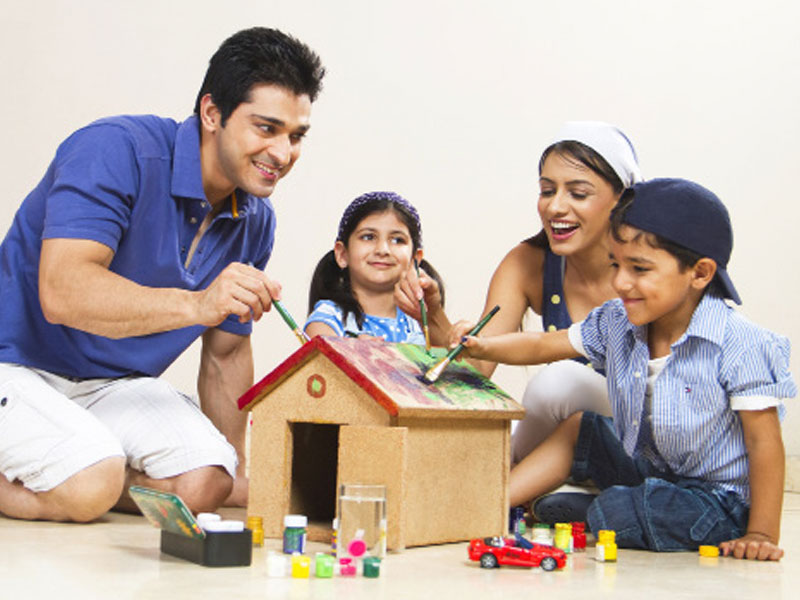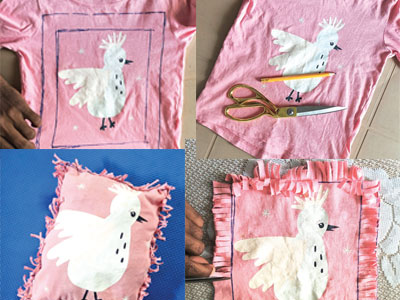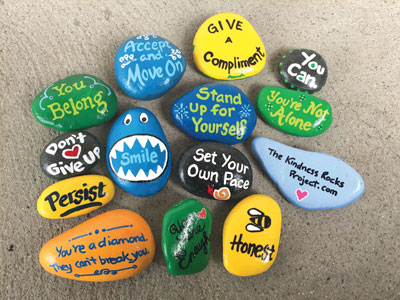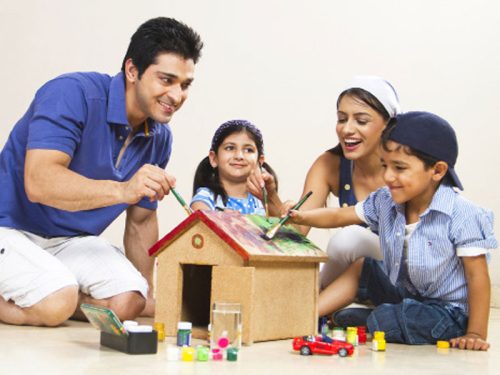Beat lockdown blues with DIY activities
With pandemic-related anxiety having become pervasive, people of all ages are developing diverse coping strategies to beat prolonged stay-athome blues. In this specially curated cover story, the PW editorial team presents enjoyable DIY activity options for children and parents – Archana N, Mini P & Cynthia John

Even as the country has begun Unlock 4.0 in the ominous shadow of the Covid-19 pandemic, life is nowhere near normal. Schools, colleges, restaurants, cinemas, and parks are still shuttered and the great majority of urban India’s children and adults is learning and working from home even as millions are battling job loss, pay cuts and remuneration delay. With pandemic-related anxieties pervasive and most families preferring to stay indoors despite lifting of stringent lockdown restrictions, people of all ages are developing diverse coping strategies to beat prolonged stay-at-home blues. A rising number of households are taking to yoga, exercise, cooking, music and embarking on DIY (do-it-yourself) projects and activities to learn new skills that can keep body and mind meaningfully engaged and perhaps transform into a post-Covid business or vocation opportunity.
 Most psychologists and counsellors advise that engaging in creative DIY activities (formerly known as hobbies) is a good option to counter lockdown stress and anxiety. “There is widespread negativity and anxiety within middle class households about the Covid-19 pandemic and its consequential socialisation restrictions. A good option for parents and children is to engage in constructive DIYn activities and learn new skills. The thrill of doing an enjoyable DIY activity releases dopamine-like neurotransmitters in the brain resulting in uplifting emotions,” says Hyderabad-based psychologist Dr. Geetha Challa, founder of Manojagrithi, an NGO working in the area of mental health.
Most psychologists and counsellors advise that engaging in creative DIY activities (formerly known as hobbies) is a good option to counter lockdown stress and anxiety. “There is widespread negativity and anxiety within middle class households about the Covid-19 pandemic and its consequential socialisation restrictions. A good option for parents and children is to engage in constructive DIYn activities and learn new skills. The thrill of doing an enjoyable DIY activity releases dopamine-like neurotransmitters in the brain resulting in uplifting emotions,” says Hyderabad-based psychologist Dr. Geetha Challa, founder of Manojagrithi, an NGO working in the area of mental health.
In particular, getting children interested in positive DIY activities is the best antidote to rising digital addiction. A recent study led by Dr. Ashok Gupta, medical superintendent and senior professor, department of paediatrics, JK Lone Hospital, Jaipur, on the effect of Covid-19 and lockdown restrictions on children in India, found that 65 percent of the 203 children surveyed reported mild to severe digital addiction and 70.7 percent with high screen exposure displayed behavioural problems such as “tantrums, irritability, stubbornness and rudeness”.
 “The outcome of digital addiction is aggression, lack of concentration, irritability, disobedience, reduced social interaction, depression and anxiety. Engaging and involving children in constructive activities such as gardening, reading, playing music or art, develops their positive energy and concentration, memory and sensory skills. Moreover, with children and parents saving on long commuting hours to school and work, there is more time to engage in DIY activities,” says Gargi (who chooses not to use a surname), a Bangalore-based freelance psychologist.
“The outcome of digital addiction is aggression, lack of concentration, irritability, disobedience, reduced social interaction, depression and anxiety. Engaging and involving children in constructive activities such as gardening, reading, playing music or art, develops their positive energy and concentration, memory and sensory skills. Moreover, with children and parents saving on long commuting hours to school and work, there is more time to engage in DIY activities,” says Gargi (who chooses not to use a surname), a Bangalore-based freelance psychologist.
Dr. Challa and Gargi’s advice to utilise the forced lockdown and prompt children to learn hands-on skills is endorsed in the recently released National Education Policy (NEP) 2020, which makes a strong case for teaching school children vocational skills and art and crafts. “Every student will take a fun course, during grades VI-VIII that gives a survey and hands-on experience of a sampling of important vocational crafts, such as carpentry, electric work, metal work, gardening, pottery making, etc, as decided by states and local communities and as mapped by local skilling needs. All students will participate in a 10-day bagless period sometime during grades VI-VIII where they intern with local vocational experts such as carpenters, gardeners, potters, artists, etc,” states NEP 2020 in a belated response to the Gandhian prescription of educating the head, heart and hands.
In this specially curated cover story, the PW editorial team presents enjoyable DIY options for children and parents.
Design a terrace/balcony garden
 Gardening en famille strengthens family bonds and simultaneously provides children excellent biology and plant life lessons. Whether you live in an apartment, home with just a small verandah, or a large bungalow, tiny and/or larger gardens can be made to grow. Maithri G.L, head of the garden consultation team at My Dream Garden, Bengaluru provides advice on how to get started: Container/pot selection. Select a container/pot that provides good aeration and permits excess water to drain out.
Gardening en famille strengthens family bonds and simultaneously provides children excellent biology and plant life lessons. Whether you live in an apartment, home with just a small verandah, or a large bungalow, tiny and/or larger gardens can be made to grow. Maithri G.L, head of the garden consultation team at My Dream Garden, Bengaluru provides advice on how to get started: Container/pot selection. Select a container/pot that provides good aeration and permits excess water to drain out.
Mix. Select mediapotting mix with 30 percent vermicompost, 30 percent cocopeat, 15 percent red soil, plant meal, bone meal, panchagavya, bio enzyme, humic granules, plant beneficial micro-organisms, turmeric powder, neem powder, and pongamia cake. Protection. Use neem oil to resist a wide range of pests and diseases. Invest time in application of nutrients and plant care managemen.
Sunlight. Leafy vegetables need a minimum of three hours of direct sunlight and other vegetables five-six hours. Some suggestions for a home garden
Carrots. This root vegetable makes a pretty house plant. Cut a large carrot about an inch from the base. Remove its leaves and plant it in soil with its crown sticking out. Soon, it will sprout beautiful  leaves. Keep your carrots in a spot that gets some sun, and some shade.
leaves. Keep your carrots in a spot that gets some sun, and some shade.
Snake gourd, bitter gourd, ribbed gourd and ladies fingers. Purchase and plant seeds. They will sprout quickly and grow fast. They’re easy to handle and the children will love to eat what they grow! An easy way to get children to love nutritive vegetables.
Aloe Vera. With its thick, hard leaves this is a plant that’s hard to kill. The leaf sap soothes burns.
Money plant and other creepers. Creepers are plants that can’t stand by themselves. They lean on walls and climb around supports. The money plant is an interesting creeper that’s easy to grow. All you need is a cutting of its stem. Place it in some water or soil. Soon, it will grow. Guide it by placing sticks or other support to climb.
Give sneakers a makeover!
Select a pair of old canvas shoes, paint brushes, acrylic paints and an acrylic paint sealer or varnish.
 Process
Process
- Use duct tape to protect the areas of white canvas shoe that you don’t want painted.
- Paint cap of the shoe and the rest of it and let it dry.
- Next, plaster a coat of sealer on the cap and let your shoes dry overnight.
- You can also add glitter and gemstone embellishments. To create a glitter mixture, add one part glitter to two parts sealant and mix thoroughly with a popsicle stick. With a fine art brush, paint a layer of glitter mixture on each shoe and let dry for 10-15 minutes.
- After painting the whole shoe, use a stencil and paint inside with the glitter.
Recycle a favourite T-Shirt
All children have their favourite T-shirts they want to cling onto even after they’ve outgrown them. Teach them to transform their favourite T-shirt into a cushion/ pillow cover.
 Process
Process
- Use colour chalk and a scale to draw a square or rectangle around the central design of the T-shirt, leaving enough space (1.5 inches) to make another square or rectangle.
- Measure 1.5-2 inches from two places along each side and make a dot. Join the dots to make a line.
- Make the second rectangle or square, with exactly the same distance between them.
- Cut along the outer rectangle/square so that all the extra sides of the cloth are chopped off.
- Now, make a straight cut, starting from the outer to the inner rectangle/square. Leave about 0.7 mm and make another cut.
- Continue to do this on all sides.
- Soon you will have a lot of dangling strings along the side. Take the upper and lower one and make a double knot.
- Knot all the dangling strings in this way, on three sides.
- When you come to the fourth side, stuff it with soft foam from an old pillow or stuffed toy. Then proceed to tie up the fourth facet as well.
Upcycling old furniture
Try your hand at upcycling ancient furniture like a wooden table or stool. It is the perfect bonding project and will preserve family heirlooms.
 Methodology
Methodology
- Sand and prime the surface of a chosen wooden stool/table to ensure even coverage.
- Paint carefully. Apply two layers for better effect.
- Print out a stencil pattern. Place a sheet of stiff butter or tracing paper, or an OHP sheet, on top of it. Use a sharp craft knife to cut out the pattern from the stencil.
- Fasten it on the table surface with cellotape and paint over it, or use a piece of sponge to apply paint. You will get a beautiful pattern.
- After it dries, you can apply a coat of varnish for a glossy finish.
Design a textured wall
 Purchase paint of two colours. Try one of these options to design a textured wall.
Purchase paint of two colours. Try one of these options to design a textured wall.
- Paint part of the wall, then use a comb or broom to create a pattern while the paint is wet.
- Pat the wall with a newspaper when paint is wet.
- Use a cardboard toilet paper roll and wrap twine around it in a zigzag manner. Dip it in paint and run it over the wall.
- Paint on bubble wrap and splotch it on the wall.
Kindness rocks
In 2015, when Megan Murphy, a women’s empowerment coach, kindness activist, and meditation instructor, left a few rocks painted with inspirational messages on her local beach in Cape Cod, Massachusetts (USA), she didn’t have the slightest inkling that it would morph into an international movement. Christened The Kindness Rocks Project, it encourages people to leave rocks/pebbles painted with inspirational messages in their neighbourhoods. During the past few months of the pandemic, the Kindness Rocks project is witnessing huge surge in popularity as it promotes kindness, mindfulness and creativity.
 Encourage your children to start a neighbourhood Kindness Rocks Project. The mission is simple: get children to paint rocks/pebbles with vibrant designs and inspiring messages, mark them with a distinguishing hashtag, and scatter them around the neighbourhood. Whoever finds a painted pebble should take a photo of it and use the hashtag to connect with other rock painting enthusiasts on social media. They can either replace the rock with one they’ve painted or hide the one they found in a new spot.
Encourage your children to start a neighbourhood Kindness Rocks Project. The mission is simple: get children to paint rocks/pebbles with vibrant designs and inspiring messages, mark them with a distinguishing hashtag, and scatter them around the neighbourhood. Whoever finds a painted pebble should take a photo of it and use the hashtag to connect with other rock painting enthusiasts on social media. They can either replace the rock with one they’ve painted or hide the one they found in a new spot.
Get started by finding smooth, flat rocks (you can even order them online). Use acrylic paints and top off with a clear layer of varnish. Paint and use simple hashtags like #thekindnessrocksproject and #painthappy
Children can also give the painted rock/pebble to specific people such as a delivery person, neighbour, or relative with the message to pass it on, or leave them around the neighbourhood for someone else to find. Or even plant them in rock gardens.
10-day fitness challenge
Monojit Ghosh, a Bangalore-based fitness trainer and gymnastics coach, shares a 30-minute workout regimen to get parents and children to exercise at home. You don’t need any equipment, a gym membership, and not even too much space to start this workout. Regular exercise improves appetite and energy levels of children.
 Warm up with some stretching exercises before beginning this workout.
Warm up with some stretching exercises before beginning this workout.
Jumping jacks: 20
Lunges: 20
Star jumps: 10
Squats: 20
Burpees: 10
Pushups: 10
Mountain climbing: 20
Side situps: 20
Glute bridge: 20
Straight leg kicks all sides: 10
Crunches: 20
Plank hold all sides 30 seconds
For detailed guidelines on performing each of these exercises, check out https://www.educationworld.in/challenge-your-child-to-aworkout/

















Add comment